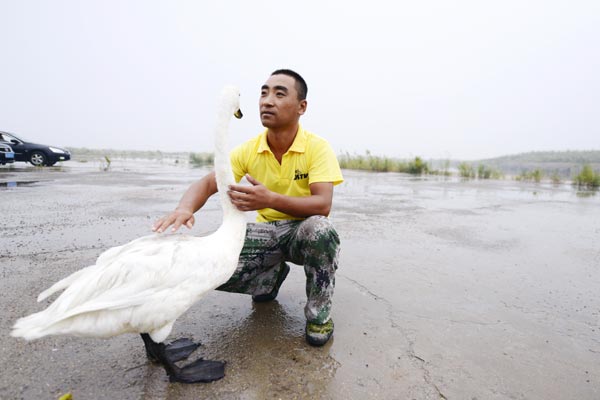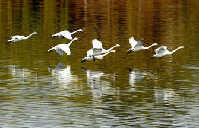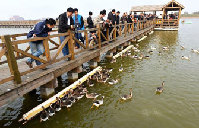Royal care for swans
 |
|
Poultry feeder Li Jian with Xiao Xue, the swan he takes care of, at the Yellow River Delta National Nature Reserve in Dongying, Shandong province. Ju Chuanjiang / China Daily |
Dongying in Shandong province provides a vital but vulnerable habitat for millions of migratory birds. The local economy has relied on petroleum and related industries, but the city's effort to find a path for sustainable development will be invaluable for the rest of the nation. Zhao Yinan reports.
|
 |
|
 |
|
 |
If Li Jian were Prince Siegfried in Swan Lake, the princess would be Xiao Xue (Little Snow). Li, 28, is a poultry feeder at the Yellow River Delta National Nature Reserve in Dongying, East China's Shandong province. The young man can be easily spotted on the vast wetlands, not because of his deep sun-tanned skin, but the white swan often clumsily tagging along with him. The swan is one of the birds that the young man takes care of, and it has won much of his attention. "When we found her in 2007, she had serious wing injuries and was left behind by a flock of swans on their way to the south," Li says.
Li volunteered to take care of the young swan. Three months later, Xiao Xue had survived, but her wings were permanently damaged and she had little hope of taking to the skies again.
"In her most difficult time, we spent days and nights together," Li says. "I couldn't bear to leave her alone, so I took her home and looked after her at night."
Li's care even evoked jealousy in other swans.
"When I went out for work and left her with other swans in the cage, she was often bullied by them. They seemed to be jealous of the attention I gave to Xiao Xue. Every time they bullied her, I mildly punished them."
The nature reserve at the mouth of the Yellow River, set up in 1992, is an important stop for millions of migratory birds on their global journey. The local economy, however, is heavily dependent on industries such as petroleum, once seen as threats to the environment.
In recent years, the local government and residents have striven to protect the environment, in part so the international wayfarers will enjoy safer passage.
More than 90 percent of the reserve's 153,000 hectares has been declared off limits to anyone but researchers.
This is an understandable measure as the reserve has been a transitional hub for more than 6 million migratory birds this year. In comparison, some 2 million people live in the coastal city of Dongying, to which the nature reserve belongs.
In spring and autumn, up to 367 species of birds stop by Dongying on their annual commute from Russia and Alaska to Southeast and South Asia and even Oceania. That accounts for 20 percent of the total bird varieties in China, the nature reserve said.
Among these frequent flyers are some of the world's most precious species. The oriental white stork, for instance, is on the verge of extinction with an estimated population of about 3,000 worldwide.
So when 36 baby chicks of this species hatched this summer in Dongying, researcher Shan Kai could not contain his delight, because he and his team at the reserve had helped bring these birds to life.
















